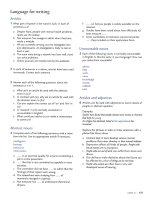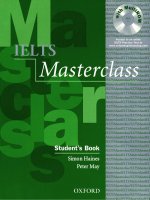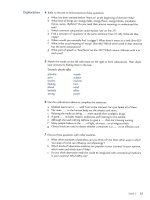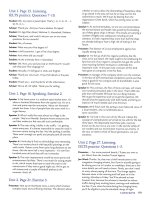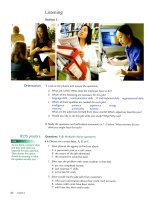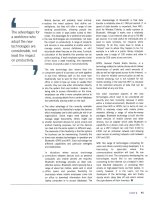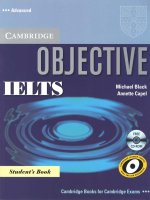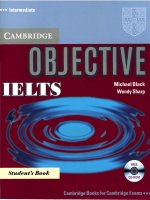ielts target 50 course book compress
Bạn đang xem bản rút gọn của tài liệu. Xem và tải ngay bản đầy đủ của tài liệu tại đây (28.83 MB, 207 trang )
~
NTV
NHA XUAT BAN TONG HOP
.
).
.
THANH PHO HO CHI MINH
,.('
CongtyTNHH
;
Nhan Tri Vi~t
'
Copyright © 2010 Garnet Publishing Ltd.
Published in Vietnam , 2010
This edition is published in Vietnam under a license Agreement between Garnet Publishing Ltd.,
UK and Nhan Tri Viet Co., Ltd.
All rights reserved. No part of this publication may be reproduced, stored in a retrieval system,
or transmitted , in any form or by any means, electronic, mechanical , photocopying , recording ,
or otherwise, without the prior written permission of the copyright owners.
Contents
Bookn~a
4
Introduction
7
General Training
Section 1
Unit 1
Life
Unit 2
Learning
Unit 3
Work
Unit 4
Achievements
----------------Unit 5
Thoughts
46
58
Review 1
70
Section 2
Unit 6
Place
Unit 7
Movement
Unit 8
Time
Unit 9
Money
Unit 10 Feelings
10
22
34
74
86
----------
-----------------
134
Review2
Section
3
--Unit 11 Health - Unit 12 Nature
Unit 13 Construction
Unit 14 Technology
Unit 15 Society- Review3
-------
98
110
122
138
150
162
174
186
_ _ _ _ _ 200
204
He exan1 vocabular
--~----------------------------Acaden~ic
Section
Introduction
208
Unit 1
Unit2
Unit3
Unit4
UnitS
212
222
232
242
252
Work
Technolog_y
Health
Society
Movement
He exan1 vocabulary
------
264
266
Answer _k _e_,y,_____
277
Workbook Answers
www.nhantnviet.com
---------------
325
Bookn:aap
General Training
Unit 1
Speaking
Vocabulary
Listening
Reading
Writing
Uni t2
Speaking
Vocabulary
Listening
Reading
Writing
Unit3
Speaking
Vocabulary
Listening
Reading
Writing
Unit4
Speaking
Vocabulary
Listening
Reading
Writing
UnitS
Speaking
Vocabulary
Listening
Reading
Life
personal information
family I stages of life
listening for specific information
skimming
organizing I types of letter I beginnings and endings I a personal letter
Learning
looking back I answering questions about the past
subjects at school I expressing preferences
listening for numbers and dates
scanning I short answers
structuring a letter I stating your purpose I closing a letter
Work
talking about work and jobs I introduction to exam task 2
work I jobs I liking and disliking a job
listening for gist
scanning for paraphrased language
register I a letter of application
Achievements
talking about success I answering exam task 3 type questions I two-way discussion
success and achievements
predicting content I listening for paraphrased language
making sure that information is given in the text I recognizing distracters
understanding the task I deciding what to say I organizing your points
Thoughts
Writing
how people think I expressing opinions I using the right expression
ways of thinking
understanding and labelling diagrams
guessing unknown words and phrases I understanding new words and phrases from
words you already know
understanding instructions I presenting a balanced argument
Unit 6
Speaking
Vocabulary
Listening
Reading
Writing
describing where you live I talking about towns and cities I comparing places
places I describing places
maps and plans I noticing how information is repeated
paragraphs I topic sentences
paragraphs and topic sentences I supporting sentences
Unit7
Speaking
Vocabulary
Listening
Reading
Writing
saying how often you do something I answering questions about travel I expressing opinions
methods of transport I ways of travelling
completing a summary I making sure answers fit
recognizing facts and opinions
linking words
Place
Movement
www.nhantriviet.com
UnitS
Speaking
Vocabulary
Listening
Reading
Writing
Time
talking about time I questions and answers I answering the question
time or no time I time expressions
completing a table
completing a summary with a choice of words I making sure answers fit
making a request
Unit9
Money
talking about money I shopping habits and preferences I expressing opinions I
follow-up comments
Vocabulary comparing time and money I words with opposite meaning
Listening
identifying key words that you don't know
understanding references
Reading
elements of a good composition I introducing opinions
Writing
Speaking
Unit 10
Speaking
Vocabulary
Listening
Reading
Writing
Feelings
saying how you feel I disagreeing politely
situations and feelings I extreme adjectives
classifying
using topic sentences to predict
complaining and requesting I linking words
Unit 11
Health
lifestyle I talking about health problems I telling stories
Vocabulary typical health problems I accidents
flow charts
Listening
sentence completion
Reading
writing a discursive composition I nouns that add cohesion
Writing
Speaking
Unit 12
Speaking
Vocabulary
Listening
Reading
Writing
Nature
talking about climate, weather and temperature I answering the question properly
climate I weather conditions
recognizing register I understanding formal and informal language
recognizing different text types
deciding what to say I writing the main part of a composition
Unit 13
Construction
talking about home and neighbourhood I contrasting ideas
Vocabulary describing your home I neighbourhood
spelling answers correctly
Listening
coping with longer texts
Reading
a letter of complaint I spelling and punctuation
Writing
Speaking
Unit 14
Speaking
Vocabulary
Listening
Reading
Writing
Technology
talking about technology I giving examples
machines, appliances, devices and gadgets I effect verbs
understanding different accents
timing yourself I improving your reading speed
having enough to say I making sure you write enough
Society
discussing social issues I fitting a punishment to a crime I explaining what you mean
when you can 't remember a word
Vocabulary social issues I crime and punishment
Listening
transferring answers to the answer sheet
checking your answers on the answer sheet
Reading
choosing what to say and how to say it
Writing
Unit 15
Speaking
www.nhantriviet.com
Book :n1.ap
Academic Section
Unit 1
Work
Reading
Writing
applying your reading ski lls to an academic text
interpreting and describing bar charts
Unit 2
Technology
Read ing
Writing
reading for gist I reading for detail I dealing w ith unknown vocabulary
interpreting and describing pie charts
Unit3
Reading
Writing
Health
recognizing paraphrased language I dealing with statistics
interpreting and describing line graphs I linking a description together
Unit4
Society
Reading
Writing
understanding references and linking
describing a flow chart I using the passive to describe a process I linking a description
of a process together
UnitS
Movement
timing yourself I checking answers
composition content (difference between General Training and Academic writing task 2) I
improving compositions for the Academic exam
Reading
Writing
6
1135fJifi#·t§fi<·l
www.nhantriviet.com
lnt:roduction
Ho'W this c::ou ..se 'Wo ..ks
IELTS Target 5.0 is aimed at students who want to take the IELTS exam while studying
at a pre-intermediate level. The aim is to prepare you for the General Training exam rather
than the Academic exam , though some additional Academic exam practice is provided
at the end of the course.
Scoring 5.0 in the General Training exam is more realistic than doing so in the Academic
exam. The length and academic content of the reading passages in the Academic exam ,
together with the more challenging writing tasks, makes the Academic course far more
demanding.
This book consists of 15 units (with an additional five units for the Academic section) and
develops in terms of challenge, to take you from a strong elementary to intermediate level.
The earlier units focus on basic skills and basic language, including sentence structure and
spelling . The texts and recordings are short and simplified to guide you and give you
confidence. By the end of the course, you will be tackling texts and working with language
that is close to the level of what you will deal with in the exam.
Each unit consists of five modules, which are briefly summarized below.
Speaking and Vocabulary
The focus is on speaking exam practice and preparing you for the type of interaction you
can expect with the examiner. There is frequent practice in understanding and answering
appropriately the type of questions that the examiner is likely to ask. The vocabulary
selected is the vocabulary that you are most likely to need during the speaking exam. You are
also encouraged to record and revise vocabulary that is particular to your interests, and that
you will need to remember in order to talk fluently about your life. There are frequent reflective
tasks that allow you to assess your progress and talk about concerns you may have.
IELTS Target 5.0 doesn't have a grammar syllabus. Grammar is dealt with mainly as
revision, as it is assumed that you will be studying grammar on a general English course at
the same time you work through this course. Some major grammar points are dealt with a
little more thoroughly, but generally the aim is to develop your ability to use the grammar to
communicate or to recognize it when you are reading.
The grammar checks in each unit focus attention on key grammar points as they arise. If
you feel that you need further practice with a particular grammar point, you should use an
appropriate grammar resource in your own time or ask your teacher to help you in the lesson.
The speaking section in each unit focuses attention on a key pronunciation point. Sometimes
this involves practising difficult individual phonemes, and sometimes it involves working
with stress and intonation. These points are there to help improve your pronunciation in
the Speaking Module of the exam.
Listening
The Listening Module is roughly divided into two parts. The first part aims to engage you
in a topic, pre-teach key vocabulary and then focus on a key skill or particular IELTS exam
technique. The second part aims to practise the skill or technique, and then encourage
www.nhantriviet.com
lf35ifJfi#.t§Jil·l
7
you to reflect and develop . Each unit focuses on a different skill or technique, but those
skills and techniques are revised as the course progresses. All listening tasks are just like
the ones you will tackle in the exam .
Reading
The Reading Module is designed like the Listening Module. Earlier units focus on a number
of short texts and general reading skills, while later units deal with longer texts and provide
practice with specific exam techniques.
Both the Listening and Reading Modules end with a focus on key vocabulary in context.
The aim here is to focus on the semi-formal vocabulary that you are likely to meet in the
recordings and texts which make up the IELTS exam. Sometimes you are encouraged to
select vocabulary from a text that you think will be particularly useful to you and that you
should record and revise .
Writing
The Writing Module focuses equally on the two parts of the writing exam. Earlier units
focus more on correspondence tasks - letter and e-mail writing - while later units focus
on the more challenging discursive compositions. Each unit provides analysis of and
practice with a particular writing skill or writing technique that is required for the exam.
There is a focus on step-by-step guided writing , and there are model compositions for
all of the writing tasks .
Consolidation and Exam Practice
This is divided into two parts . The first part revises the speaking focus and vocabulary
presented in the first module. Occasionally, a speaking skill will be developed and there
might be a new focus . The second part practises listening, reading or writing skills under
something closer to exam conditions. The units in the first section of the book practise
two skills with short tasks that students are able to manage. The units in the second two
sections focus on one skill and provide fuller exam practice.
Exam Tips and Question-type Tips
These tips occur all the way through the course. They are there to help you know how to
approach the various tasks that make up the exam, and to provide advice on how to go
about getting the highest score possible in the exam. They also give advice that will help
you to improve your all-round level of general English .
Reviews
There is a review at the end of each of the three sections. The aim is not simply to revise
language that has been learnt, but to reflect on what has been achieved and what needs
most work. There are tasks that encourage you to revise the vocabu lary you have learnt
independently and to reflect on which of it is most useful to you .
Mock Tests
There are three mock tests provided as pamphlets in the book. The first two tests are
designed to be slightly more challenging than the content of the course, but not quite
as challenging as the actual exam. The third mock test is at the level you can expect from
the exam. You should do the tests when you have completed the relevant section of the
Course Book, i.e., test 1 when you have completed the first section and so on.
a
1135tJfO·t4fi!·l
www.nhantriviet com
Workbook
There are Workbook tasks for each of the first four modules in the Course Book units.
You might complete these tasks in class if your teacher feels that you need further practice
with a point, or complete them for homework. In the Course Book Reading Modules,
direct reference is made to these Workbook tasks, as the tasks specifically focus on the
content of the Reading Module.
As you work through the course, you will learn more about the exam and what you have
to do in each module. By the end of the course, you will know everything about every part
of the exam and what is expected of you. When you have finished the General Training
course, you will be ready to either sit the General Training exam or take a short course that
will prepare you for the Academic exam.
IELTS Target 5.0 Academic
Some students are studying at a pre-intermediate or intermediate level, but need to pass
the Academic IELTS exam in order to enter university or apply for a job . At the end of
IELTS Target 5.0 General Training, there is a short course that provides practice specifically
for the Academic exam.
IELTS Target 5.0 Academic focuses on the reading and writing skills that you need to
progress toward the Academic exam, and will prepare you to sit the exam within a few
weeks. There is a longer introduction to IELTS Target 5.0 Academic and some introductory
tasks for you to complete at the beginning of that section.
vww.nhantriviet.com
Life
Speaking 1: talking about personal information
Match the pictures a-f with the questions 1--6.
1. Are you studying or are you working? _
3. Where are you living at the moment? _
5. Do you enjoy travelling?_
2. Do you have brothers and sisters? _
4. What do you do in your free time? _
6. What do you hope to do in the future? _
Ask and answer questions 1-6 with a partner.
Grammar check
In American English, 'Do you have ... ?' is frequently used.
In British English, 'Have you got ... ?' is frequently used .
Answer these questions.
1. Which two questions are in present continuous?
2. Why is a continuous form used in the two questions?
Speaking 2 : exchanging personal information
Match the following questions 1-8 about people 's lives with the answers a-h.
10
1.
2.
3.
4.
5.
6.
7.
8.
Where are you from?
What 's your city like?
How old are you?
What do you do for a living?
Do you have a big family?
Are you married?
Do you have any children?
What are your hobbies and interests?
g
Listen and check your answers.
IIHNfJfU.tĐJiôãl
a.
b.
c.
d.
e.
f.
g.
h.
It's very big and very busy.
I read a lot and sometimes play chess.
No, I'm single.
From Riyadh. It's the capital city.
Yes, one son . His name's Sam .
Yes, I have five brothers and two sisters .
I'm an accountant.
I'm twenty-four.
www.nhantriviet.com
Pronunciation check
g
Listen to these questions again. Notice the contraction of is and the pronunciation
of are and do.
1 . What's your city like?
2. Where are you from?
3. Do you have a big family?
Practise asking the questions using the weak forms.
Ask and answer questions 1-8 in Exercise A with a partner.
Vocabulal"y 1: members of your family
g
Listen and write the words. Focus on your spelling.
1.
6.
2.
7.
3.
8.
4.
9.
5.
10.
Pronunciation check
gListen again and notice that in mother, brother and son the letter 'o' is pronounced !tJ
The sound IAI is very common in family words.
Practise saying the words.
Vocabulal"y 2: stages of life
Label the pictures w ith the correct words.
Cover Exerc ise A and write the stages in the order that they come in life.
1.
4.
b;rJ-J,
2.
5.
3.
6.
Vocabulal"y 3: using key words and phrases to speak
Check the highlighted words and then answer t he questions with a partner.
1.
2.
3.
4.
5.
6.
Were you born in the same place as your parents?
Do any of your other relatives live in the same place?
Are your grandparents retired?
Are any of your friends teenagersf?
Do you know somebody who has more than five childre!J[?
When does somebody become an adult in your country?
www.nhantriviet.com
Watch out!
My brother has three childs. )(
He is teenager. )(
Where did you born? )(
1135i'Jfh.tĐJ"!ãI
11
Listening 1: listening for specific information
Read sentences 1- 10 and look at the gaps. What ki nd of informat ion is missing?
Match each of the ideas a-j with a sentence.
1.
2.
3.
4.
5.
6.
7.
8.
9.
10.
I'm staying at the Ocean Inn on Tenth Avenue. _g._
She died in
, a year after her husband.
You can contact us on _ _ _ _ _ __
The best person to talk to is Tom _ _ _ _ _ __
The whole package costs $ _ _ _ _ __
The host family address is 56 _ _ _ _ _ _ _ Lane.
He started playing the violin at just _ _ _ _ _ _ years old.
Simon and Rebecca have known each other for _ _ _ _ _ __
The tour ends in
on the fifteenth of July.
The next meeting will be on _ _ _ _ _ __
a. the name of a city
c. somebody's age
e. a phone number
g. the name of a hotel
i. the name of a street
b.
d.
f.
h.
j.
a person's surname
a date
a period of time
a year
the price of something
In which answers do you need to use capital letters? In which answers can you
write figures as the answer?
g
Now listen and check your ideas.
g
Listen again and fill in the missing information.
Listening 2: practising listening for specific information
Exam tip: In section 1 of the Listening Module, you often need to fill in missing
information. In other parts of the exam, you also need to listen for information
such as names and dates.
g
Listen and complete the notes about two people who work at Esco
Engineering. Write no more than three words or a number for each answer.
12
II 35fj ;gh.tĐJi<ãl
www.nhantriviet.com
ESCOEngineering
Name:
Address:
Tel. no.
Staff Data
Peter (1) - - - - - -(2)
Argyle Street
Tunbridge Wells, Kent TN3 5RQ
'
07984 645792
Age:
(3) _ _ _ _ __
Marital status:
Married
(has (4) - - - - - - -· two boys and a girl)
Date of joining company:
ESCOEngineering
08 I (5) - - - - - -
Staff Data
Jane (6) _ _ _ _ _ __
Name:
Address:
Road ,
72 (7)
Crowborough , Kent CR3 5RO
Tel. no.
07984 (8) - - - - - (9) _ _ _ _ __
Age:
Marital status:
Date of joining company:
(10) _ _ _ _ __
02 I 2005
Check the key on page 266. How many questions did you answer correctly?
Tick the sentences about the listening task that are true for you and think about
how you can answer more questions correctly next time.
1.
2.
3.
4.
5.
I read the instructions carefully.
I read the questions and predicted the type of answer I needed to write.
I used capital letters when necessary.
I understood all the words on the answer sheet.
I spelt all my answers correctly.
\'JW? Question-type tip: In the Listening and Reading Modules, the instructions will
l,? often tell you to write two or three words as your answer.
Key vocabula .. v in context
Fill each space with one word from the staff data file.
1. Your
is where you live.
2. Your
is how old you are.
3. When you fill in a form,
'Are you married?'
www.nhantriviet.com
is more formal than saying
1135tJfhÃtĐJ"IãI
13
Reading 1 : skimming
Exam tip: It is important to know the source of a text, for example if it comes
from a newspaper, a magazine or a journal.
Read the sources 1-6 below. Skim the texts A-F and match each with a
source 1-6.
1 . information from a box or packet
k
3. an advertisement
5. part of an article from
a science journal _
2. an e-mail to a friend
4. a letter about a job interview
6. part of a letter written to
a newspaper
1
..../"
0
Do vou want to lose
weight last:-
To: grah~
~
Cc:
Subjtct: - - - - - - - - - - - - - - :
It's easier than ever before!
Try our new product for a slimmer,
Hi Graham ,
Sorry, I won't be ab le to play golf on Saturday as
planned. Some of my wife's relatives are coming for
the weekend so I'll have to be here. I should be free
one day next week - I'll call you .
happier future.
Phone Trixie on 01256 987742
I
Sorry again,
Dave
c
------------~------~
D
he birth of triplets is
becoming more and more
common. Technology which
assists reproduction is the main
cause. The use of fertility drugs
and the placing of three or four
embryos in the uterus can result
in multiple births. Another cause
may be the number of older women having children . Women
over the age of thirty are more likely to have twins or triplets .
T
Dear Sir,
I am writing to say how shocked I
am by the behaviour of many
teenagers in the city centre. They
congregate in large groups, they
are aggressive and they use very
bad language. Young people don't
seem to understand that older
people like me · • ·
£ ~----------------~
r
Care & Use
• Each cartridge will filter 150 litres
of water and should be replaced
every month.
Dear Miss Sulaiman,
.
for our letter applying for a place on our part-time
Thank you
y
W would like to invite you for an
English for Work course. e
interview on 12"' March at 2 p.m.
• Fits most leading brands.
Yours sincerely,
• Before first use, wash with hot
soapy water and dry.
Mr J Sullivan
(Director of St udies)
www .nhantriviet.com
14
1135ibJfU.tĐfj(ãl
Talk with a partner. Discuss how you completed the task. Did pictures help? Did you
identify key words? Did the design of each text help you to identify its source? Did
you use any other techniques?
Exam tip: It is also important that you know the purpose or function of a text
(why the text has been written).
Skim the texts again and answer these questions. You might be able to answer
some questions without reading again.
1.
2.
3.
4.
5.
6.
In which text does somebody complain?
Which text is an apology?
Which text makes an appointment?
Which text wants people to buy something?
Which text explains why something happens?
Which text tells you how to do something?
Read this short text about reading skills. Circle the correct option from each pair.
Skimming is looking slowly I quickly through a text to get a general I detailed
picture of what it is about. You might skim through a magazine to see wh ich stories
are interesting or skim the first few pages of a book to see if you want to read it. You
often skim before I after you read a text more carefully. In the IELTS exam, you skim a
text in order to identify which parts you need to read again more quickly I slowly.
Reading 2: practise skimming
Exam tip : In various parts of the Reading Module, you will need to skim read.
Read the sources 1-6 below. Skim the texts A-F and match each with a source
1-6.
1. part of an e-mail to a friend
2. a formal invitation
3. an advertisement
4. an extract from a biography (a book about the life of a person)
5 . part of a web page that gives advice
6. a story from a newspaper
A
B
To: 1
PERSPECTIVES OF WORK
AND JOB SATISFACTION
eople often see work from one of three
perspectives. All three pe rspective~ are
important for job satisfaction , but one 1s usually
the most important.
P
... and I must say that I'm really enjoying life
here in New York. My job's great and my new
apartment is just fantastic. So I hope you can
come and visit me soon. I can 't wa it to show
you all the sights ...
c
Mohandas Karamchand Gandhi
was born in Porbander, a coastal town in western India, on 2 October, 1869.
His father, Karamchand Gandhi, was an important figure in the state of
Porbander. His mother, Putlibai, was Karamchand's fourth wife, the first
three wives having died in childbirth.
www.nhantriviet.com
"as ;;J tt :. m'"'''
1s
D
0(/
,':/oa a ;re
.
., I
ou,tlea
to celebrate the weddin.,. of
,./uJan
L
ffa.ry
E
Recentlv retiredil
:1J.r:~hkuo
and
q;«/u:e(~e '-
!fa rJha/1
At 2 p.m. on Saturday 17" March
St Anne's Church, Brighton
R.S.VP.
Enjoy later life with Makethemost.com .
This site is designed for people
ove r 60 who want to continue making
the most of later life and who want to
plan and enjoy retirement.
I
Check out Makethemost.com now.
F
Train Driver Loses
Fight for Life
Terry James, the train driver who was
injured in last week's tragic train crash in
Luton , has lost his fight for life. He died
early yesterday evening at King's Hospital.
Check the key on page 266. How many questions did you answer correctly?
Tick the sentences about the reading task that are true for you and think about
how you can answer more questions correctly next time.
1. I read the instructions carefully.
2. I skimmed the text quickly to do the task.
3. I looked for key words and phrases to help me match .
4. I didn't worry about all the words that I don't know.
5. I'm pleased with how quickly I did the task.
Key vocabulal'y in context
Look at these sentences and then look again at t he key words in the texts.
Circle the correct option from each pair.
1. If something improves, it gets better I is not so good.
2. An increase means that something goes up I goes down.
3. Your perspective is what you do at work I how you see things.
4. An important figure is an important person I building.
5. When there is a wedding , somebody dies I gets married.
6. If you are injured , you die I are hurt.
-
16
For focus on reading skills, go to Workbook page 5.
1135fJfh·!JJi<·l
www .nhantriviet.com
II
W~riting
1: organizing your writing
Exam tip: To write well, you need to plan and organize. When you do the
Writing Module, you won't spend all the time you have actually writing.
Put these stages of the writing process into a logical order.
a.
b.
c.
d.
e.
f.
Quickly note down lots of ideas.
Read your work and check for errors.
Read the question and the instructions very carefully.
Write your letter or composition.
Decide which ideas you are going to include in the composition.
Make a rough plan with paragraph headings.
\J Talk w ith a partner. You have 20 minutes to write a letter of about 150 words.
How long should you spend on each of the stages in Exercise A?
W~riting
2: types of letter I starting and ending letters
1J These are the types of letter that you might need to write in the first section of
the IELTS Writing Module. Match each type with one of the opening lines A-F.
1 . a personal letter
3. a formal business letter
5. a letter of complaint
A
B
c
2. a job application
4. a letter requesting information
6. a formal letter of apology
Dear Sir/Madam,
I would like to know more about the Sports Science cou rse that you run at your college.
=--J
Dear Sir/Madam,
I am writing to express my dissatisfaction at the service I received at one of your
restaurants last weekend.
Dear Mr Jones,
I am writing to inform you that I will not be ab le to attend the conference in January.
I really a m very sorry.
--==-----"-
D
Hi Louis,
Thanks for the photos -I got them this morning. I love the picture of Greg with that snake!
E
Dear Mrs Cole,
I am a colleague of Martin White and I am writing as one of his referees to support
his application for ...
F
~--~==~------~
Dear Mr Lucas,
I am writing to apply for the job advertised in yesterday's Daily Argus.
www.nhantriviet.com
lf35{Jfi4·l§fi<·l
17
Highlight the useful phrases that are used to open a letter. Then choose one of the
opening lines, look at it for 30 seconds, close your book and write it in your notebook.
Now decide which of these endings are appropriate for each letter A-F.
I look forward to hearing from you soon.
Yours faithfully,
Mark King
3
Anyway - must get on now. See you at
Jake's party next week. Love to Claire.
Best,
Tom
Once again, I would like to apologize.
Best wishes,
Lucy Hayes
I look forward to receiving your reply.
Yours faithfully,
Graham Downs
I fully recommend him for the position.
Yours sincerely,
Simon Fox
•
Talk w ith a partner. Answer these quest ions.
1 . When do you close a letter with Yours faithfully and when with Yours sincerely?
2. When is it acceptable to use Best wishes or Regards?
3. What are some other ways of ending an informal personal letter?
w ..iting 3 : organizing points in a personal letter
You are going to stay with a family in Britain and you want to write a letter to
introduce yourself. Which of the information in the box below would you include?
your appearance
why you're learning English
your age
your family
your studies or job
your favourite music
your friends
where you live
your favourite food
your name
your hobbies and interests
your personality
Read the letter below and put the ideas in Exercise A into the order in which they
appear. Does Bruno include the same points that you wanted to include?
_ _ _ _ Mr and Mrs Gray,
I'h'l Bruno and I'h'l 22. I live in Valencia, which is a big cil-y on 1-he easl- coasl- of Spain
I live wil-h h'IY h'IUh'l and dad and h'IY sisl-er, Lola, bul- I hope 1-o go 1-o universil-y in Barcelona nexlyear and I wan/- 1-o gel- a flal- wil-h soh'!e friends. My dad is a lawyer and h'IY h'IUh'l works parl--l-ih'le
al- a nursery school I've gol- a brol-her called Carlos.
In h'IY free 1-ih'le I play fool-ball and /-ennis, and I soh'!el-ih'!es go rock clih'!bing. I really enjoy
h'IOSI- sporl-s and wan/- 1-o sl-udy sporl-s psychology nexl- year. I love going oul- 1-o discos, 1-oo,
and I especially love rap h'IUSic.
People say I'h'l very friendly and oul-going, and I like 1-o 1-hink I'h'l generous. I know I can be a bilsl-ubborn soh'!el-ih'!es - I like 1-o do 1-hings h'IY own way. I need 1-o ih'lprove h'IY English for h'IY sl-udies,
bul- I also love /-ravelling, and 1-he besl- way 1-o h'!eel- people is 1-o speak good English.
I ah'l looking forward 1-o h'!eel-ing you bol-h very soon.
Bruno
Start and end the letter in an appropriate way.
-
18
Go to Workbook page 6 for the writing task.
1135fJfhÃtĐJiôÃl
www.nhantriviet.com
I
~;---- - --------- -- -- - -------------- - --------- ---- - -- ------------------------~,
\
Speaking
A Talk with a partner. Answer these questions about the first part
of the Speaking Module.
1. How long does the first part of the Speaking Module take?
2. Is it about a third or about half of the total Speaking Module?
3. What kind of questions will the examiner ask?
B
----------------, '
I
Look at these possible questions. Tick them if you think they are easy to answer and
cross them if they are difficult to answer. Then compare your thoughts with a partner.
1 . What do you like doing in your free time?
2. Which part of the world would you most like to visit?
3. Why are you learning English?
4. How long have you lived there? (your hometown)
5. Who was your favourite teacher at school?
6. Tell me about a famous person that you admire?
C Walk around the class. Practise asking and answering the questions with other students.
Vocabulal"y
A Write one word to complete each sentence below.
1. Your mother and father are your _ _ _ _ _ _ _ __
2. Your father's father is your _ _ _ _ _ _ _ __
3. Your mother or father's brother is your _ _ _ _ _ _ _ __
4. Your mother or father's sister is your _ _ _ _ _ _ _ __
5. Your son's sister is your _ _ _ _ _ _ _ __
6 . The children of your uncles and aunts are your _ _ _ _ _ _ _ __
7. All of the people in your family are your _ _ _ _ _ _ _ __
B
Fill the gaps with words made from the root words in the box.
1. What do you do for a
living ?
One of my uncles has got ten _ _ __
I didn't have any brothers and sisters, but I had a very happy _ _ __
I want to be happily
before I'm thirty.
My father seems to be very happy in his _ _ __
2.
3.
4.
5.
C
live
child
child
marry
retire
g
Mark the main stress on these key words from the unit. Then listen and check.
Practise saying the words.
1. interests
2. family
3. relatives
4 . teenager
5. retirement
6. adolescence
7. improve
EI"I"OI"S
A There are errors in all of these sentences (sometimes more than one). Correct them.
1.
3.
5.
7.
He's from new york.
Have you brothers and sisters?
His name's alan murray.
Where was you born?
2.
4.
6.
8.
My father's engineer.
I have 22 years.
I work for a company called friendly products.
I write to apply for job in yesterday's newspaper.
'' ~------------------------------------ - ---------- - --------------------------------------------'
www.nhantriviet.com
1135fJfh·lJJ"!•I
19
Listening
g
For questions 1-4, listen and complete the notes. Write no
more than three words or a number for each answer.
Name of guest:
Charles (1) _ __
Number of nights:
(2) _ __
Home address:
25 North Road,
(3) _ __
MAl 4-CP
Room:
(4) _ _ __
For questions 5-7, listen and choose the correct answer.
5. Why is the guest travelling?
a. on holiday
b. on business
c. for a football match
6. What was the guest's meal on the plane like?
a. big and very good
b. small but very good
c. small and not very good
7. Where is the guest going to eat?
a. in the hotel restaurant
b. in a restaurant outside the hotel
c. in his room
For questions 8 and 9, label the map. Write the correct letter A-F next
to the places below.
8. Mamma Mia's
9. the bank
zo II 3Ni'J i' q.t§ Ji<·l
www .nhantriviet.com
NVh
l,7
Question-type tip: In the Listening and Reading Modules, you often have to
choose answers from options.
Reading
Look at this extract from a web page for one minute and decide which subject
1 , 2 or 3 it is about.
1 . how to get a good job
2. why most people are unhappy at work
3. different ways of thinking about a job
Perspectives of work and job satisfaction
A. People often see work from one of three perspectives. All three perspectives are
important for job satisfaction , but one is usually the most important.
B. It's a job. If you see work as a job and no more, you focus mainly on the financial
rewards. In fact, you might have very little interest in the work you do. If a job with
more pay comes along , you'll probably take it.
C. It's a career. If you see work as a career, you want to advance. You want to climb
the career ladder as far as possible or be among the top professionals in your
field. You're motivated by the status and power that go with the job.
D. It's a calling. If you see your job as a calling , you focus on the work itself. You
work for the satisfaction and fulfilment the work brings rather than for financial gain
or career advancement.
E. Do you recognize yourself? One perspective isn 't necessarily better than the
others. But it's helpful to think about why you work if you're unsatisfied with your
job and it's making you unhappy. Think about why you took your current job in the
first place and whether that is a factor in your lack of job satisfaction.
The text has five parts, A-E. Skim the text again and match each part with one
of these sentences.
1.
2.
3.
4.
5.
Some people want to be important.
People see work in different ways. _
People should think about why they do their job.
For some people, money is not important.
Some people work only for money. _
Question-type tip: In the Reading Module, you often need to match
sentences or questions with parts of a text.
www.nhantriviet.com
1135{Jfi2·t§Jil·l
21
Lea.. ning
Vocabula .. y 1: subjects at school
Correct the spelling for the school subjects.
1. mathmatics _ _ __
4. siense
7. biolagy
2. histery
5. kemistry
8. economiks
3. geografy _ _ __
6. fisics
Check that you understand the meaning of each subject. Tick the ones that
you studied at school.
Speaking 1: looking back
Match the pictures a-f with the sentences 1-6.
1.
2.
3.
4.
5.
6.
My favourite subject at school was Chemistry. _
I really enjoyed sports at school._
I wasn 't very good at Maths. _
The teachers at school were very strict. _
We had to wear a school uniform.
I had to do homework every night. _
Pronunciation check
Listen to the pronunciation of these subjects.
Practise saying the ending Ilks/, as in 'Physics', 'Mathematics', 'Economics'.
g
Talk with a partner. Use the pictures to talk about what you remember about school.
22
IIH5i'JfdÃtĐJi!ãl
www.nhantriviet.com
Grammar check
We use the past simple to talk about finished time. Regular verbs end
in -ed, but there are some spelling rules that you need to remember.
Watch out!
Write the past form of these verbs into the sentences.
How went you to school in
the morning? )(
learn
1.
2.
3.
4.
stop
decide
study
I don't liked school when I was little. )(
I must did homework every night. )(
_ __ ___ to swim when I was five years old .
______ Medicine at university.
______ to leave university and find a job.
______ learning guitar because I was too busy.
Remember to use did in negative and question forms .
Where did you learn .. . ?
I didn't like school much.
There are a lot of irregular verbs, and some of them are used very frequently. You
need to learn them .
Write the past form of these verbs.
1. know
2. read
3. think
4. teach
5. choose
There is no past form of must, so we use had to . Had to is followed by the base verb.
We had to wear a uniform to school.
Pronunciation check
Listen to the pronunciation of the regular verbs in the sentences. Note the
difference between /t/ and /d/ and /Id/ at the end of verbs .
1. I finished my homework late last night.
2 I played football after school.
3 I hated Physics at school.
g
Speaking 2: answering questions about the past
g
Look at these questions about being at school. Then listen to some
students answering them. Tick the speaker who gives a better answer.
1 . Did you enjoy being at school?
2. What was your favourite subject at school?
3. Who was your favourite teacher at school?
Speaker 1 _
Speaker 1 _
Speaker 1 _
Speaker 2
Speaker 2
Speaker 2
Walk around the classroom . Ask and answer questions 1-3 in Exercise A.
Vocabula .. y 2: likes and preferences
,
Look at how the highlighted words and phrases are used in these sentences.
Write (P) if the speaker is positive or (N) if the speaker is negative.
1. I really liked learning Mathematics at school.
2. I didn't like History very much.
3. I liked Physics, but I preferred Chemistry.
4.
5.
6.
7.
8.
My favourite subject was Economics.
I really hated learning History.
I loved learning on computers.
I always enjoyed my English classes.
I was very keen on sports when I was at school.
9. I thought Geography was really boring .
1 0. The most interesting subject was Science.
Talk with a partner. Talk about the subjects you studied at school using the words
and phrases above. Say why you liked or didn't like some subjects.
www.nhantriviet.com
113 5tJ;; q.t§ Jil·l
23
Listening 1 : listening for numbers and dates
Work with a partner. Practise saying these numbers.
60
16
g
g
100
166
600
606
616
660
666
Listen and check. Then practise saying the numbers again.
Listen and write the numbers that you hear.
1.
2.
5.
6.
g
160
4.
8.
3.
7.
Listen and practise saying these bigger numbers.
1,000
10,000
100,000
1 '1 00
1,500
1 ,550
1 ,555
Unjumble the letters to write the twelve months of the year in the spaces.
yanurja
arybruef
amrhc
prail
yam
neuj
austgu
bersetepm
oberoct
vemnoerb
mdeecerb
January
ujyl
Cover Exercise E and write the twelve months of t he year in the spaces.
Be careful with your spelling.
January
g
Listen to the pronunciation of the months. Then practise saying them.
Write the ordinal numbers in the spaces below.
1. (1)
2. (2)
3. (3)
4. (4)
5. (5), _ __
7. (7)
8. (8)
9. (9)
10. (10)_ __
6. (6)
11 . (12) _ _ _ _ 12. (15) _ _ _ 13. (20) _ _ _ _ 14. (25)_ _ _ _ 15. (30)_ _ __
g Listen to the pronunciation of the ordinal numbers. Then practise saying them.
g
Listen to someone saying the date below in t w o different ways.
I Dec:;er 15
1
Practise saying these dates in two ways.
January 10
g
1.
3.
March 20
April 25
September 30
Listen and write the dates that you hear.
2.
4.
www.nhantriviet.com
Talk with a partner. Answer these questions with a date.
1. What date is your birthday?
2. What date is your mother's birthday?
3. What date is your father's birthday? 4. What date is Christmas Day?
5. What date is New Year's Eve?
6. What date is American Independence Day?
Listening 2: practise listening for numbers and dates
II
Question-type t ip : You will need to listen for numbers and dates in various
parts of the Listening Module. The information will always be in the same order
as the questions.
g
A man is telephoning his local college about a course. For questions 1 and 2,
listen and choose the correct answer.
1. Graham wants to do a course in .. .
a.
b.
c.
d.
Physics
Geography
Photography
Philosophy
2. Graham wants to know about ...
a. the beginner's course
b. the intermediate course
c. the advanced course
For questions 3-8, complete the man's notes. Write no more than three words
or a number for each answer.
Course s+arl-s - (3) _ _ _ __
There are (4)
lessons over fJ,;rl-een weeks.
Course finishes (5) _ _ _ __
Course costs (6) £
paid in advance. No refund.
Between (7) _ _ and 10 students in fJ,e class. (8) _ _ people on las+ course.
For questions 9-12, complete the booking form that the receptionist fills in.
Name: (9) _ __ _ _ __
Address: Flat (1 0) _ _ _ _ _ _ _ , (11) _ _ _ _ _ _ _ Chelsea Court.
Age: (12) _ _ _ _ __
Check the key on page 266. How many questions did you answer correctly?
Tick the sentences about the listening task that are true for you and think about
how you can answer more questions correctly next time.
1.
2.
3.
4.
5.
6.
I read the instructions carefully.
I read the questions and predicted the type of answer I needed to write.
I used capital letters when necessary.
I spelt all my answers correctly.
I know why I got some answers wrong .
I am pleased with how many questions I answered correctly.
Key vocabula .. y in context
Cross out any wrong words in these sentences.
1. My History course I class I lesson begins at 9.00 a.m.
2. The course I class I lesson lasts for 13 weeks.
3. It is a small course I class I lesson . There are only six students.
www.nhantriviet.com
1135fJfhÃtĐJ"!ãI
zs

